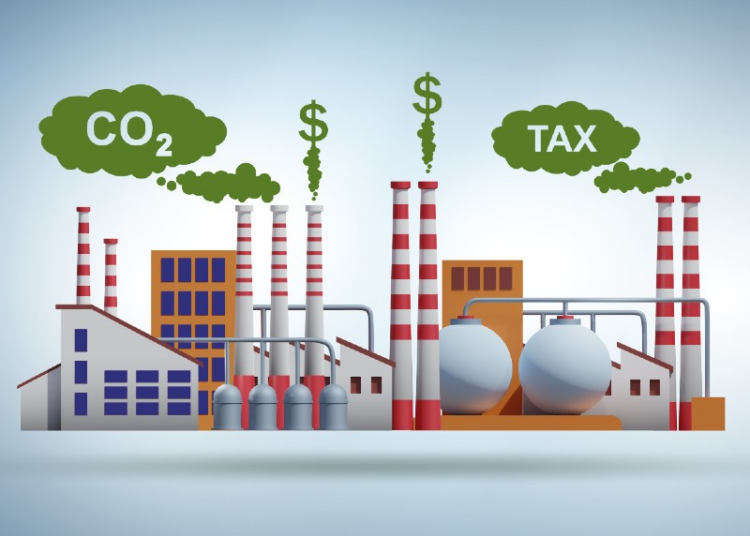Federal government has concluded plans to unveil a carbon tax policy and budgetary system for the country, in line with the recently approved Energy Transition Plan, as part of the Climate Change Act.
Director general of NCCC, Salisu Dahiru, disclosed this to State House correspondents after meeting with President Muhammadu Buhari, at the Presidential Villa.
He said the agency sort and obtained approval to initiate key deliverables contained in the Climate Change Act, including establishing a carbon budget for the country
At the recent meeting in Abuja, President Buhari had approved the Energy Transition Plan, to be driven by the National Council on Climate Change (NCCC), in accordance with the Climate Change Act 2021.
A Carbon tax or tax on greenhouse gases come in two broad forms, namely; an emissions tax, which is based on the quantity an entity produces; and a tax on goods or services that are generally greenhouse gas-intensive, such as a carbon tax on gasoline.
Under the arrangements, he said the federal government is expected to set a price which emitters pay for each ton of greenhouse gas emissions.
According to him, the tax, apart from helping to generate revenue for government, will encourage consumers to take steps to switch fuels, adopt new technologies and reduce emissions to avoid paying the tax.
He said “That is now going to provide allowances for every entity, whether government or private sector, in terms of how much emissions it may be allowed, and exceeding those emissions could also attract penalties.
“What will be the nature of these penalties, these penalties are going to be contained in another deliverable that the Climate Change Act has also requested the council to do.
“That is to develop a framework for a carbon tax system in Nigeria where projects are being implemented in the country.
“These projects are capable of reducing overall carbon or greenhouse gas emissions. The harvest of these emissions reductions are normally contained in what we call a emissions reduction certificate, which can be translated into carbon credit, and then sold to potential buyers within the country and outside.”
He disclosed that the Council also instructed the Secretariat to develop the framework for carbon trading, and also to develop the framework for establishing the climate change fund for Nigeria, which will serve as the main source of revenue and inflow of funds that will be used for running of the council as well as to undertake projects that will help Nigeria to fulfill all his obligations under the nationally determined contributions, as well as under the net zero target of 2016.
“The President also endorsed the Council as the Designated National Authority for the United Nations Framework Convention on Climate Change (UNFCCC) and the DG, NCCC as the UNFCCC National Focal Point, in line with the Climate Change Act 2021.
Dahiru noted that even though some of those things have already been mentioned in the Climate Change Act 2021, the council needed to sign off on those activities, to give the Secretariat the Go ahead, to start carrying them out. In essence, they include the operationalisation of the office itself.
“Because this is a climate change institution, we want to ensure that we comply with all the requirements of climate change compliance, as it is in the act, and also in Nigeria’s obligations under the NDCs.
On the net zero target, he stated that the institution must reflects its mandate, in terms of its outlook and in terms of the way that it runs its affairs, including where it is going to stay, as the structure should be as green as possible, and also to be a net zero building in terms of the carbon emissions that could be associated with it.
“This means that the office complex must be seen to clearly demonstrate our commitments to renewable energy compliance for the main building and also reduction on its overall operations. And limiting, for instance, the use of paper, which we know comes from trees that have been felled
Speaking on gas flaring, the DG said part of the Council’s mandate is the implementation of the energy transition plan.
“This Energy Transition Plan, which is the first among many African countries, is predicated on the use of natural gas as the transition foil for Nigeria as the transition energy source, and we know that what has been flared, is actually natural gas. So, we also know that one of the added advantages that the energy transition plan is going to have is to help to close the energy or power or electricity gap that we’re experiencing in the country.
“We are going to use the energy transition plan as the main launchpad for capturing the gas needed, if you take the population of Nigeria, which is over 200 million, and we are already experiencing shortages in terms of electricity, and utilizing this gas for even domestic use alone is something that is going to be a big positive.
“So, the government is pursuing the implementation of this ETP as a very important project that will have multiple benefits, including reducing the energy gap.
“It will also help to find you know, economic utility or utilization for our abundant natural gas and also to create, you know, the stimulus for industries to also shift from diesel to start the use of natural gas as the main fuel for the generators and for the operations and therefore help to promote economic growth and also create jobs”
Nigeria Earns $4.8bn From Non-oil Export In 2022 – NEPC The Nigerian Export Promotion Council has expressed its commitment to ensure that in 2023, Nigeria makes more than $4.82bn it generated from non-oil export business in 2022.
Ekiti State Coordinator of NEPC, Iyabode Abe, said that the Council under the leadership of the Chief Executive Officer, Yakussak Ezra, will continue to promote the development of non-oil export in other to safeguard the nation’s economy.
Abe spoke in Ado Ekiti at a-one day technical and training session on product packaging for exporters and Small and Medium Enterprises in Ekiti State.
“Over $4.82bn was generated from the non-oil export business in the year 2022 as a result of the Council’s effort in promoting non-oil export which jacked up the Gross Domestic Product economy of the country by 15 per cent,” she said
The event was organised by NEPC where the Council donated two packaging machines to be domiciled at the Technical Incubation Centre in the capital city for use by SMEs in the state to package their products.
She said that the Council was committed to stepping up efforts to promote non-export through training programmes, “That will expose SMEs to some technicalities of export business for them to have clear competitive edge in the global market.”
The coordinator, who described the population of Nigeria SMEs as one of the greatest assets of the country in its economic diversification agenda, urged the entrepreneurs on product packaging and labelling, which she described as essential driver for a sustainable marketing of made in Nigeria products in the export market.
The Special Adviser to Ekiti State Governor on Trade and Investment, Omotayo Adeola, who lauded NEPC for the training and donation, said the state government is very keen on providing support and guidance to our SMEs to help them upscale and increase production.





